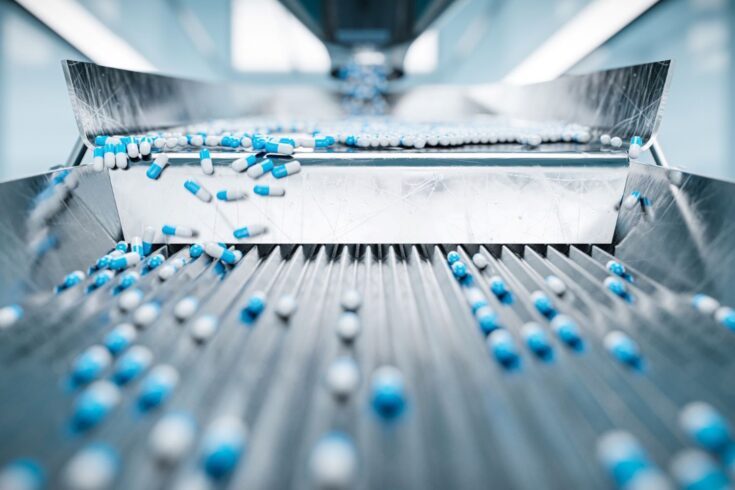Channels
Special Offers & Promotions
UK start-up to develop tech for pharma factory in space

A start-up is developing technology to build a pharmaceuticals factory in space that could help improve the lives of patients undergoing antibody treatments for cancer and other diseases.
Currently, for patients undergoing antibody cancer treatments, this involves spending hours at a time in hospital to undergo intravenous infusions, which are both time consuming and invasive.
To address this issue, start-up company BioOrbit is aiming to transform how this treatment is administered as it investigates the potential to manufacture antibody cancer therapy drugs in space. These drugs would be administered from the home just as with insulin, which is itself composed of small crystals.
Superior proteins
BioOrbit’s aim is to make antibody cancer treatments more accessible and convenient through a new approach, based on the crystallisation of drugs.
If drugs are crystallised, they can be injected just under the skin, just as with insulin.
However, protein antibody drugs are especially hard to crystallise, and when this is done on earth, they are not high enough quality.
This is where space comes in. When antibodies are crystallised in space, in the absence of earth’s gravity, this allows for the creation of superior quality crystals compared to those formed on earth.
Manufacturing drugs in space
BioOrbit is one of the most recent innovative companies to join the European Space Agency Business Incubation Centre United Kingdom (ESA BIC UK).
Here it is poised to take its technology to the next level, by developing the necessary hardware for large-scale crystallisation in space for protein antibody drugs.
This technology has the potential to benefit patients in remote areas with limited access to hospitals, as well as to those that are immune compromised, who would benefit from staying away from hospitals.
Support for space tech start-ups
The ESA BIC UK is part of the world’s largest business incubation programmes for space tech start-ups, managed by the Science and Technology Facilities Council (STFC) in collaboration with:
- ESA
- UK Space Agency
- University of Leicester
Since 2011, it has supported more than 130 UK start-ups and entrepreneurs, using space and satellite technologies to develop new products and services across a diverse and exciting range of sectors, from sustainability to health technologies.
Start-ups involved with the ESA BIC UK have a 95% survival rate over five years following graduation from the programme, more than double the UK average, despite the economic uncertainties of the last few years.
Extraterrestrial testing
Katie King, founder and CEO of BioOrbit, said:
“By taking antibodies into space and crystallising them there, where there is a superior crystallisation process, we can then bring that drug back down to earth and patients can treat themselves from the comfort of their own homes.
“We are really excited to have joined the ESA BIC UK, which is invaluable to our business, particularly in terms of the business support and advice from important new connections we are making.
“For BioOrbit, this is a really critical phase in the development of our technology, which we have tested and proved in principle. Through the ESA BIC UK, our sights are now set on building our payload and sending it in to space to see what data comes back.
“Long term, our vision is to establish a pharmaceutical manufacturing facility in space within the next decade, enabling patients to access treatment conveniently at home.”
Transformative potential
Paul Vernon, Executive Director of Business and Innovation at STFC, who also initiated the creation of the ESA BIC UK just over 10 years ago, said:
“By developing a new generation of cancer therapy drugs in space, BioOrbit is pioneering a future where cancer patients can experience less invasive treatment from their own homes.
“Their technology has the transformative potential to reshape the way we approach certain cancer treatments in the future, and could significantly improve the quality of life for cancer patients.
“At the ESA BIC UK, this is exactly the kind of thing we set out to enable businesses to achieve, and which could generate far reaching benefits for our society and economy.”
Space for commercial success
The ESA BIC UK provides start-ups with 12 to 24-month support package to help them through the development of their game-changing products and services in an increasingly competitive and global marketplace. This includes:
- around £43,000 funding (£51,000 from 2024)
- access to IP, technologies and expertise generated by ESA research
- access to STFC’s world class expertise and research facilities
- dedicated business support
Get involved with the ESA BIC, wherever you are in the UK
Up to 15 companies per year can join this UK-wide programme at:
- Harwell Science and Innovation Campus in Oxfordshire
- Sci-Tech Daresbury in the Liverpool City Region
- Royal Observatory in Edinburgh
- University of Leicester’s new Space Park Leicester
Each location is firmly associated with world leading specialisms, providing a unique network of science, innovation and business opportunity.
Companies joining the programme can benefit from these specialisms wherever they are located in the UK. Calls for proposals to join the ESA BIC UK take place throughout the year. Find out more about the ESA BIC UK and how to apply.
About The Science and Technology Facilities Council (STFC)
The Science and Technology Facilities Council (STFC), part of UK Research and Innovation (UKRI), funds and supports research in particle and nuclear physics, astronomy, gravitational research and astrophysics, and space science. It operates a network of five national laboratories and supports UK research at a number of international research facilities including CERN, FERMILAB and the ESO telescopes in Chile. STFC is keeping the UK at the forefront of international science and has a broad science portfolio, and working with the academic and industrial communities to share its expertise.
Media Partners


